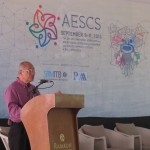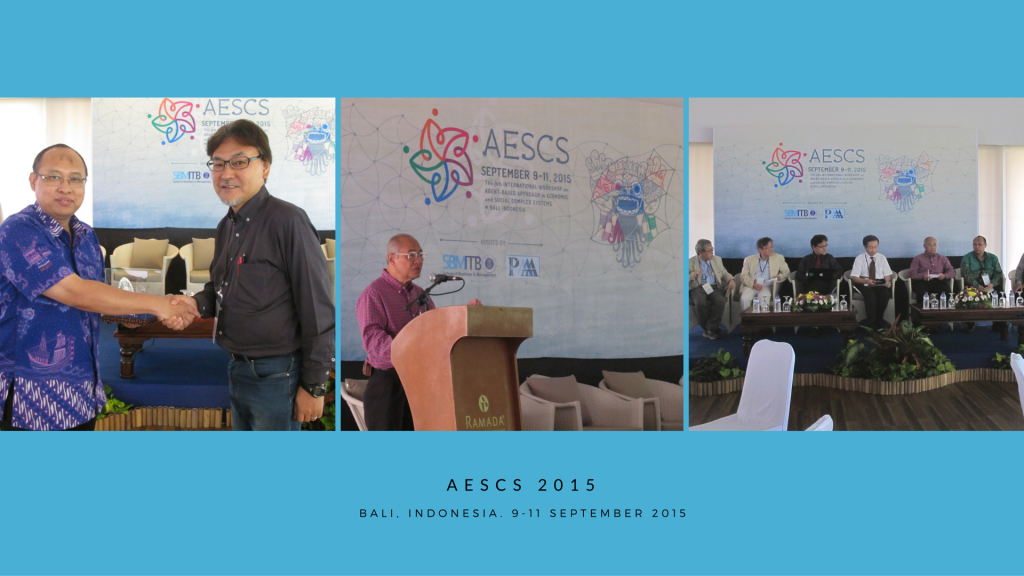 Pan-Asian Association for Agent-based Approach in Social Systems Sciences (PAAA) along with SBM ITB organized The 9th International Workshop on Agent-based Approach in Economic and Social Complex Systems (AESCS) 2015 in Bali, Indonesia from 9-11 September 2015. This event is the regular conference of PAAA every two years. It mainly focuses on applications of agent-based technologies to social complex systems.
Pan-Asian Association for Agent-based Approach in Social Systems Sciences (PAAA) along with SBM ITB organized The 9th International Workshop on Agent-based Approach in Economic and Social Complex Systems (AESCS) 2015 in Bali, Indonesia from 9-11 September 2015. This event is the regular conference of PAAA every two years. It mainly focuses on applications of agent-based technologies to social complex systems. Pan-Asian Association for Agent-based Approach in Social Systems Sciences (PAAA) along with SBM ITB organized The 9th International Workshop on Agent-based Approach in Economic and Social Complex Systems (AESCS) 2015 in Bali, Indonesia from 9-11 September 2015. This event is the regular conference of PAAA every two years. It mainly focuses on applications of agent-based technologies to social complex systems.
Pan-Asian Association for Agent-based Approach in Social Systems Sciences (PAAA) along with SBM ITB organized The 9th International Workshop on Agent-based Approach in Economic and Social Complex Systems (AESCS) 2015 in Bali, Indonesia from 9-11 September 2015. This event is the regular conference of PAAA every two years. It mainly focuses on applications of agent-based technologies to social complex systems.
Attended by academicians and also researchers, AESCS 2015 gives opportunities for them to discuss the effectiveness and limitations of computational models and methodologies for social sciences. Conference participants presented the latest results of various researches, and discuss emergent phenomena and modeling issues of social complex systems, which will provide further understanding on social complex problems with agent-based technologies.
On three days program, participants involved in seminar by keynote speakers, panel discussion, parallel sessions, and also workshop on agent based modeling.
In the first day, the workshop starts with the keynote speakers from Prof. Kuntoro Mangkusubroto (Institut Tekonologi Bandung) and Prof. Takao Terano (Tokyo Institute of Technology). Prof. Kuntoro talked about ?Managing Complexity in Decision Making: Actors, Interactions & Environment? that describe the complexity of problems arise in many problems in Indonesia. The approach of Agent-Based Modeling and Simulation is one of methodology that suitable to cover the problems. In line with Prof. Kuntoro, Prof. Terano talked about “A Shape of ABM to Come” that describe the evolution of Agent-Based Modeling and Simulation and how we integrate the ABM methodology with technology. To deal with this integration we need to be international, cooperate and collaborate among researchers.
The continuity of this discussion follows up by panel discussion. In this panel discussion we invite experts of ABMS, Prof. Kuntoro Mangkusubroto (SBM-ITB), Prof. Utomo Sarjono Putro (SBM-ITB) from Indonesia; Prof. Kyoichi Kijima (Tokyo Institute of Technology), Prof. Hiroshi Deguchi (Tokyo Institute of Technology), Prof. Takao Terano (Tokyo Institute of Technology) and Prof. Shingo Takahashi (Waseda University) from Japan, and Dr. Pri Hermawan (SBM-ITB) as the moderator. This continues discussion talked about increasing complexity of the problems and how decision maker facing this complexity. Once again, the panelist agreed that Agent-Based Modeling and Simulation is one suitable methodology to deal with complexity. The futures of ABMS, bottom-up, heterogeneous and autonomy agent, interdependent of interaction, non-linear, and emergent properties can uncover the complexity of problems. After lunch, the parallel session was held and follows by welcoming party. During the parallel session, we also held the SOARS workshop for Indonesian research in the first and second day. In this SOARS workshop we introduce the participants about the ABMS methodology and simulation tools, especially SOARS, to simulate the ABM.
In the second day, the keynotes speaker from Dr. Ragupathy Venkatachalam (National Chengchi University, Taiwan) with topic “Agent-Based Modeling as a Foundation of Big Data” was suitable to trigger our mind to start the second day workshop. The agent-based simulation society must take their data more seriously than its current state and the agent-based model cannot be fully harnessed without the resort to big data analytics. After the parallel session, we refresh our self by watching the KECAK dance at Uluwatu. We also have a gala dinner at Jimbaran.
In the third day, Prof. Kyoichi Kijima (Tokyo Institute of Technology) give his talk about “Service Ecosystem Innovation: Agent-based Approach”. In this topic, Prof. Kijima introduce a concept of Systemic Innovation Model of Service Ecosystem. With the three levels of co-evolution of service ecosystem, i.e., micro, meso, and macro, the methodology of ABM can be applied to analysis the processes at each level. After the parallel session, the workshop was closed during the lunch. Prof. Utomo gave short closing speech. Overall, the workshop was held successfully. See you in the next AESCS. Please visit below link about AESCS 2015
www.paaa.asia/aescs2015/
About PAAA
PAAA is the Pan-Asian regional platform to explore the frontiers. PAAA works closely with its American equivalent, NAACSOS and the European Social Simulation Association, ESSA. The objective of PAAA is to promote worldwide activities of the multi-disciplinary community on multi-agent, computational economics, organizational science, social dynamics, and complex systems. PAAA let researchers and practitioners bring together from diverse fields, such as computer science, system science, economics, physics, sociology, psychology, and complex theory in order to understand emergent and collective phenomena in economic, organization, and social systems. PAAA will also give opportunities to discuss the effectiveness and limitations of computational models and methodologies for social sciences. Please visit below link about PAAA:
www.paaa.asia/
Written by: Margareth Tobing
Attended by academicians and also researchers, AESCS 2015 gives opportunities for them to discuss the effectiveness and limitations of computational models and methodologies for social sciences. Conference participants presented the latest results of various researches, and discuss emergent phenomena and modeling issues of social complex systems, which will provide further understanding on social complex problems with agent-based technologies.
On three days program, participants involved in seminar by keynote speakers, panel discussion, parallel sessions, and also workshop on agent based modeling.
In the first day, the workshop starts with the keynote speakers from Prof. Kuntoro Mangkusubroto (Institut Tekonologi Bandung) and Prof. Takao Terano (Tokyo Institute of Technology). Prof. Kuntoro talked about ?Managing Complexity in Decision Making: Actors, Interactions & Environment? that describe the complexity of problems arise in many problems in Indonesia. The approach of Agent-Based Modeling and Simulation is one of methodology that suitable to cover the problems. In line with Prof. Kuntoro, Prof. Terano talked about “A Shape of ABM to Come” that describe the evolution of Agent-Based Modeling and Simulation and how we integrate the ABM methodology with technology. To deal with this integration we need to be international, cooperate and collaborate among researchers.
The continuity of this discussion follows up by panel discussion. In this panel discussion we invite experts of ABMS, Prof. Kuntoro Mangkusubroto (SBM-ITB), Prof. Utomo Sarjono Putro (SBM-ITB) from Indonesia; Prof. Kyoichi Kijima (Tokyo Institute of Technology), Prof. Hiroshi Deguchi (Tokyo Institute of Technology), Prof. Takao Terano (Tokyo Institute of Technology) and Prof. Shingo Takahashi (Waseda University) from Japan, and Dr. Pri Hermawan (SBM-ITB) as the moderator. This continues discussion talked about increasing complexity of the problems and how decision maker facing this complexity. Once again, the panelist agreed that Agent-Based Modeling and Simulation is one suitable methodology to deal with complexity. The futures of ABMS, bottom-up, heterogeneous and autonomy agent, interdependent of interaction, non-linear, and emergent properties can uncover the complexity of problems. After lunch, the parallel session was held and follows by welcoming party. During the parallel session, we also held the SOARS workshop for Indonesian research in the first and second day. In this SOARS workshop we introduce the participants about the ABMS methodology and simulation tools, especially SOARS, to simulate the ABM.
In the second day, the keynotes speaker from Dr. Ragupathy Venkatachalam (National Chengchi University, Taiwan) with topic “Agent-Based Modeling as a Foundation of Big Data” was suitable to trigger our mind to start the second day workshop. The agent-based simulation society must take their data more seriously than its current state and the agent-based model cannot be fully harnessed without the resort to big data analytics. After the parallel session, we refresh our self by watching the KECAK dance at Uluwatu. We also have a gala dinner at Jimbaran.
In the third day, Prof. Kyoichi Kijima (Tokyo Institute of Technology) give his talk about “Service Ecosystem Innovation: Agent-based Approach”. In this topic, Prof. Kijima introduce a concept of Systemic Innovation Model of Service Ecosystem. With the three levels of co-evolution of service ecosystem, i.e., micro, meso, and macro, the methodology of ABM can be applied to analysis the processes at each level. After the parallel session, the workshop was closed during the lunch. Prof. Utomo gave short closing speech. Overall, the workshop was held successfully. See you in the next AESCS. Please visit below link about AESCS 2015
www.paaa.asia/aescs2015/
About PAAA
PAAA is the Pan-Asian regional platform to explore the frontiers. PAAA works closely with its American equivalent, NAACSOS and the European Social Simulation Association, ESSA. The objective of PAAA is to promote worldwide activities of the multi-disciplinary community on multi-agent, computational economics, organizational science, social dynamics, and complex systems. PAAA let researchers and practitioners bring together from diverse fields, such as computer science, system science, economics, physics, sociology, psychology, and complex theory in order to understand emergent and collective phenomena in economic, organization, and social systems. PAAA will also give opportunities to discuss the effectiveness and limitations of computational models and methodologies for social sciences. Please visit below link about PAAA:
www.paaa.asia/
Written by: Margareth Tobing




